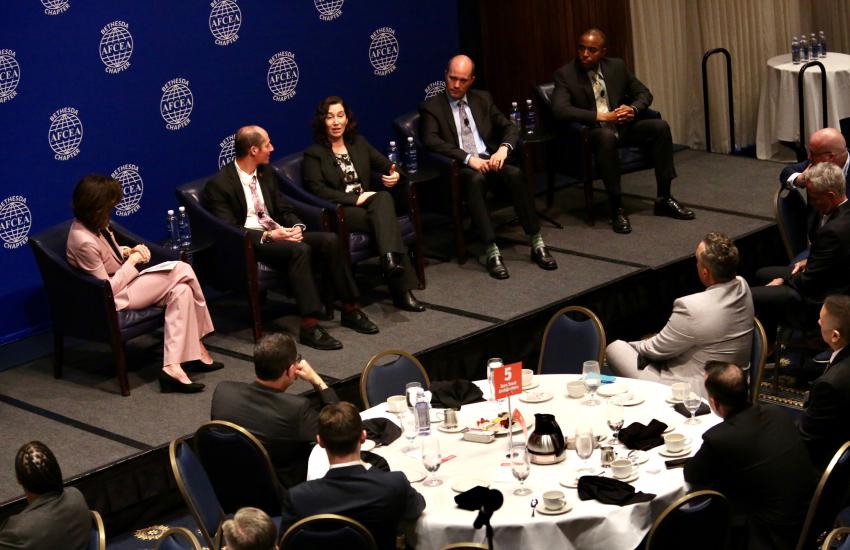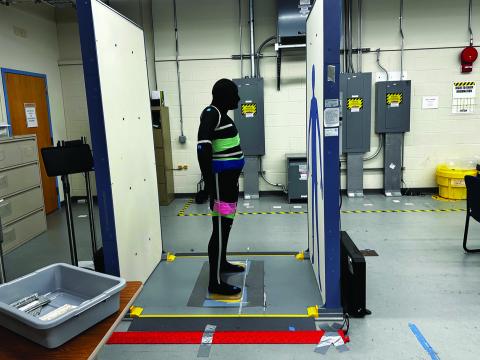Public Trust Goes Hand In Hand with Modern Tech
A trending topic among this year’s Law Enforcement & Public Safety (LEAPS) Technology Forum speakers was lawful access for national security.
The event, hosted by AFCEA’s Bethesda Chapter, took place on May 10 at the National Press Club.
Opening keynote speaker Robert Brown, executive assistant director for the FBI Science and Technology (S&T) branch, pointed at a photo taken in the summer of 2020 of a lone cop being surrounded—and protected—by protesters. Though the photo highlights a moment of hope in a time of extreme crisis, Brown pointed out that the important factor is building back the community’s trust.
“Obviously, a lot has changed since [that] summer, we weren’t using body-worn cameras back then, we should have 20 years ago,” Brown stated.
The lack of necessary equipment was similarly pointed out by Matthew Feinberg, section chief in the field operations section for the FBI. “This is more than an equipment problem,” Feinberg said. “We’re talking about the enclaves and information flow.”
Body-worn cameras are not considered a new technology; however, they have not been quickly adapted by the FBI, though they have been an industry standard for years, according to the speakers.
President Biden’s push for body-worn cameras has caused the successful roll out of the equipment being used by every FBI agent in New York, Miami, Milwaukee, Atlanta, and soon to be Texas and more cities and states nationwide.
The bottom line in introducing any new technology lies in transparency, a quintessential aspect in earning public trust.
"Without lawful access … you have illegal activities within the community, making it difficult for law enforcement to investigate and prosecute crimes,” Brown stated. Events like child exploitation, domestic violence and the Parkland shooting at Marjory Stoneman Douglas High School were all mentioned during his address.
“Did you know that the lawful intercept market is $3.9B this year?” Katie Noyes, section chief at FBI S&T, asked the audience. “And it’s proposed for a 21-29% increase over the next three years. So how do we get excitement around lawful intercept?” Noyes challenged industry to come up with solutions for advanced lawful access.
Speakers additionally touched on other technologies.
Noyes referred to a 5G hospital operated by the Department of Veterans Affairs, which has holographic visualizations to represent medical professionals.
Doğan Perese, deputy assistant director for the FBI IT Applications and Data Division, spoke on text-based emotion detection tools. By reading emojis and certain words used in text applications, the detection tool will be able to understand the emotion the sender, and receiver, is experiencing.

Unfortunately, bad actors and criminals still have access to the overwhelmingly growing number of modern technologies. Brown pointed out the potential use of artificial intelligence (AI) to generate face morphing, a tool used to hide criminal identities.
Deep fakes, which are synthetic digitally manipulated media to convincingly replace a person’s look, are hazardous in the game of misinformation. Similarly, voice generative AI will also pose challenges in the future.
“In early 2022, a report claimed that a deep fake video depicting Tesla CEO Elon Musk, his face and voice was used to fool investors interested in cryptocurrency,” Brown shared.
Ultimately, speakers agreed that new and modern technologies should be leveraged to protect the American public. And though there will be a shift in the workforce, a human will still remain in the loop, according to Perese.
The event was concluded by First Responder Network (FirstNet) Authority CEO Joe Wassel, who reminded the audience that the goal for the first responder community is "Operation Come Home for Dinner.”





Comments